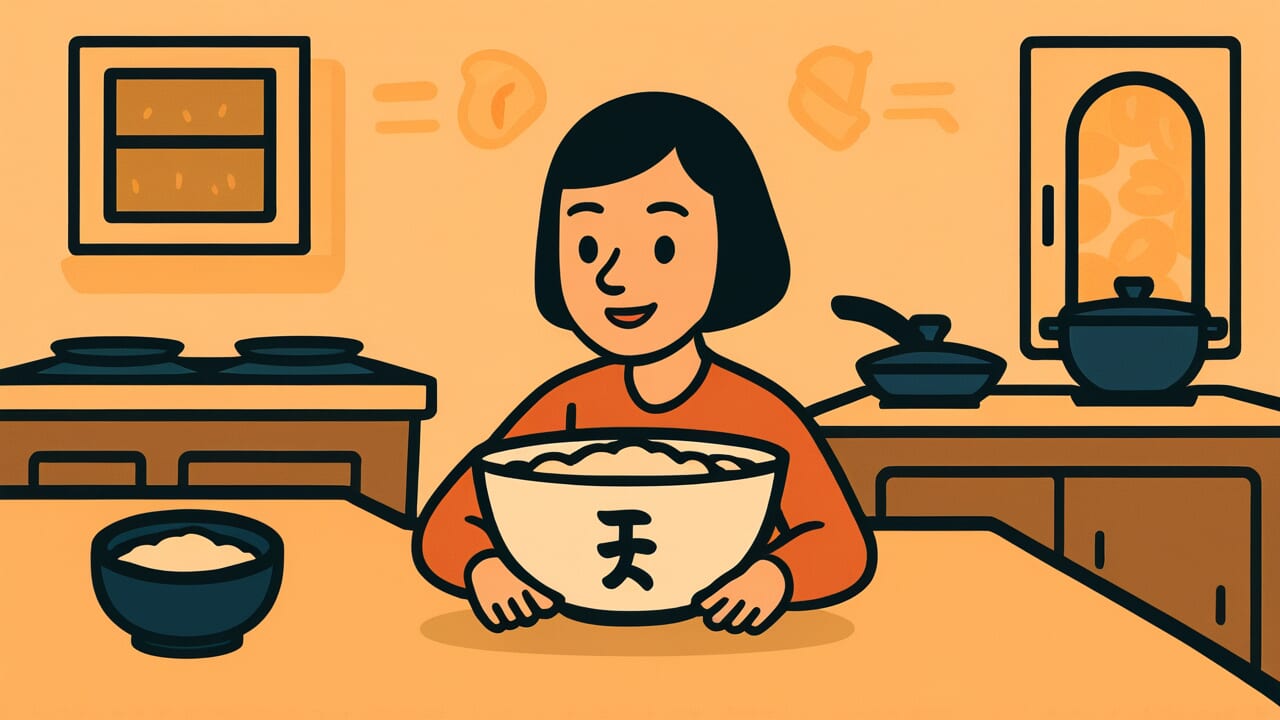How to Read “One never tires of one’s wife and rice meals”
Nyōbō to kome no meshi ni wa akanu
Meaning of “One never tires of one’s wife and rice meals”
This proverb means that even though you encounter your wife and rice meals every day, you never grow tired of them.
They may not be flashy or exciting, but they are essential and precious parts of daily life.
Rice meals are the staple food of Japanese people. No matter how often you eat them, you never get bored.
Instead, eating rice continuously sustains your body and gives you the energy to live.
Similarly, daily life with your wife may not be thrilling. But as time spent together accumulates, you realize how important and valuable her presence truly is.
This proverb is used when talking about marital relationships. It’s especially used to express the goodness of couples who have been together for many years.
It conveys the value of steady, unchanging love. Today’s world often seeks stimulation and change.
But this proverb teaches us that unchanging happiness in daily life is true richness.
Origin and Etymology
There are no clear records about the exact origin or first appearance of this proverb.
However, we can consider its background through the structure of the phrase and the history of Japanese food culture.
First, let’s focus on the expression “rice meals.” Before the Edo period, white rice was not something common people could eat regularly.
Especially in rural areas, meals mixed with millet or barley were typical. White rice meals were special treats for important occasions.
Still, rice held the position of being the staple food of Japanese people. It was basic food that people never tired of eating daily.
Meanwhile, “nyōbō” is a traditional word meaning wife. By placing these two together, the proverb expresses that a wife’s existence is like rice meals.
She is fundamental and essential to life.
Behind the birth of this proverb lies a Japanese aesthetic. It values unchanging worth in daily life rather than seeking flashiness or excitement.
Like rice meals that appear on the table every day, daily life with one’s wife is true richness in life.
This wisdom of living is embedded in the saying. It’s a simple and warm expression that naturally emerged from the lives of common people.
Usage Examples
- We’ve been married for 30 years, and “One never tires of one’s wife and rice meals” is truly well said
- I sought excitement when I was young, but now I understand the meaning of “One never tires of one’s wife and rice meals”
Universal Wisdom
The truth this proverb speaks is that what’s truly important to humans isn’t flashiness or excitement.
It’s the unchanging presence in daily life. Why don’t people tire of rice meals?
Because rice isn’t just food. It builds our bodies and supports our lives as a foundation.
Similarly, a wife’s existence is also a foundation of life. She is a companion who walks through life together.
Human psychology has an interesting duality. We’re attracted to new and exciting things.
Yet we also feel deep comfort in stable and unchanging things. In early romance, we seek stimulation and excitement.
But when considering a long life, what we truly need is a trustworthy presence to spend each day with.
This proverb was born and has been passed down for generations. This is because humans instinctively understand this truth.
Fancy feasts are delicious because we eat them occasionally. If we ate them every day, we’d grow tired.
But rice meals never bore us because of their simplicity. Human relationships are the same.
Exciting relationships don’t last long. But calm, trustworthy relationships enrich our lives.
Our ancestors saw through this unchanging essence of human nature.
When AI Hears This
The human brain responds strongly to new stimuli. But when the same stimulus repeats, nerve cell responses weaken.
This is called “neural adaptation.” For example, if you go to a fancy restaurant every day, your initial excitement drops by half within a week.
Yet this proverb lists wife and rice meals as “things you don’t tire of.” This claim contradicts neuroscience principles.
Actually, two neural mechanisms are hidden here.
The first is the “subtle change detection system.” Rice meals look the same, but cooking level, moisture content, and temperature differ slightly each time.
Human relationships are similar. A wife’s expressions, voice tone, and reactions change daily.
The brain’s prediction error system continues activating the reward system for this “almost the same but not completely identical” pattern.
If completely identical, we’d get bored. But changes within predictable ranges don’t bore the brain.
The second is the uniqueness of survival rewards. Carbohydrates like rice meals raise blood sugar and directly supply fuel to the brain.
This physiological reward, unlike entertainment rewards, resists adaptation. This is why meals when hungry always taste good no matter how many times you eat.
Similarly, stable human relationships are essential for social survival. The brain’s reward system may have evolved to suppress adaptation.
This proverb empirically identifies two exceptional patterns where the brain avoids boredom.
Lessons for Today
What this proverb teaches modern people is that happiness isn’t in special places.
It’s in daily life. Modern society constantly drives us to seek new stimulation.
On social media, we see others’ glamorous lives. Our own daily routines may seem dull by comparison.
But what is true richness? Isn’t it having a place to return to every day?
Having someone to share meals with? Having unchanging days continue?
This proverb teaches us that such ordinary daily life is actually an irreplaceable treasure.
In relationships with important people, you don’t need to constantly seek excitement or novelty.
Rather, relationships where you feel comfortable together and can be yourself last long and support your life.
Like rice meals, noticing the value of having something by your side every day.
That might be the secret to enriching life. Let’s cherish the happiness in today’s unchanging daily routine.



Comments